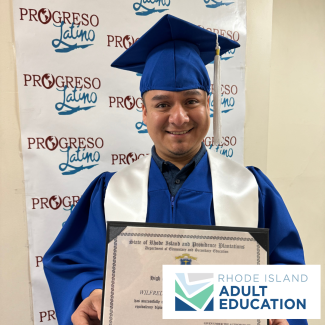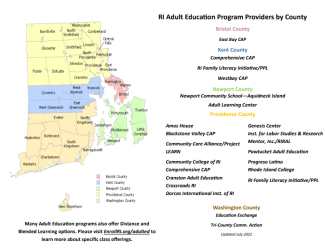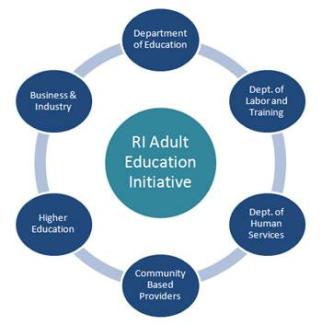Adult Education and GED
If you are looking to register for Adult Education classes, visit EnrollRI.org/AdultEd or email info@riadulted.org to learn more.

Rhode Island Adult Education supports adult learners in gaining skills and credentials for employment, citizenship, and family and community leadership. There are 5 different types of classes:
- Adult Education (Reading and Math)
- English for Speakers of Other Languages (ESOL)
- High School Certificate/GED
- Job Skills Training
- Citizenship
Classes are offered at local programs across the state. Many programs offer classes in person, online, and hybrid. Visit EnrollRI.org/AdultEd to browse a full list of program providers and the types of classes they offer.
Resources for Learners

Are you interested in Adult Education classes but don't know where to start? Adult Education Information Centers can help! For more information, or to contact any of the centers, email info@riadulted.org .
Rhode Island Adult Education has several physical Information Center locations around the state to help learners find the best classes for them and begin the registration process. Information Center staff provide free, individualized support to help you enroll in Adult Education.
Click this link to see a current list of Information Center locations and walk-in hours.
If you have questions about this program, or would like to partner with the Information Centers, email Allison.Habermehl@ride.ri.gov .

General Educational Development Test - GED®
The Rhode Island High School Equivalency Program is composed of the General Educational Development (GED) Tests, which are administered throughout the state by testing centers authorized by the Board of Education. The Rhode Island High School Equivalency Diploma is issued to those eligible individuals who successfully complete the GED Tests.
GED RESOURCES
- Current GED Testing Center List
- RI High School Equivalency Program Regulations
- GED Testing Service
- Directions to Obtain GED Diploma and Transcripts
- GED Transcript Mail Order Form
- Protect Yourself from GED Test Fraud
You must go through an authorized Rhode Island testing center to take all in-person or online GED tests in order to receive your High School Equivalency Diploma. Websites that offer credentials and diplomas without going through a testing center are fake and will not be recognized by colleges or employers. To learn more about GED Test Fraud, please visit the link above.
GED VOUCHERS
The state of RI provides vouchers for GED test takers who are unable to afford exam fees. Vouchers are available for either in-person or online exams.
- An explanation of how to apply for a voucher is linked here in English and in Spanish
- The voucher application is linked here in English and in Spanish
- The complete voucher application should be submitted to a test center, either in person or by email. This is a list of GED test centers in the state.
**RIDE also has a limited number of GED Ready (practice test) vouchers for use by low-income Rhode Islanders. Please reach out to info@riadulted.org for more information.
National External Diploma Program - NEDP
Some Rhode Island school districts offer a high school diploma based upon successful completion of the National External Diploma Program (NEDP). The NEDP is a performance assessment system that is competency-based, and expects adults to demonstrate their ability in a series of simulations that parallel job and life situations. Participants are evaluated against a criterion of excellence instead of by comparison to others.
Several RI Adult Education Programs offer the NEDP. For more information visit:
Email info@riadulted.org for support finding the best high school equivalency program for you.
Adult education programs provide classes that help students achieve their goals. Some goals for adult learners include:

- Gaining basic academic skills, like reading and math
- Improving English skills
- Becoming ready for work, career and college
- Finding and keeping a job
- Progressing along a career pathway for a better job
- Attaining high school credentials and industry certificates
- Enrolling in college and postsecondary education/training
- Becoming more involved in the community
-
ADULT EDUCATION PROGRAM RESOURCES
- RI Adult Education Professional Development
- RI Adult Education Programs by County with Map (updated July 2022)
- Current GED Testing Center List (updated December 2022)
- Adult Education Programs, Courses, and Contact Information (EnrollRI.org/adulted)
-
RI ADULT EDUCATION DATA SYSTEMS
- e-RIDE
- LACES (Literacy, Adult, and Community Education System)

In July of 2011, the Rhode Island General Assembly passed revised compulsory attendance legislation, which requires students to attend school until they are 18 years old. The RI Compulsory Attendance Statute (RIGL 16-19-1) and the adoption of the Alternative Learning Plan (ALP) is an effort to prevent students from dropping out of school and, subsequently, being placed into truancy court. The statute encourages schools and families to work together so that students remain enrolled in school, via an ALP, so that students may continue to work toward earning a high school diploma or its equivalent.
The Compulsory Attendance Statute mandates that students be in continuous school enrollment until the age of 18. The statute allows for a superintendent or head of school to waive the attendance requirements for those students 16 years of age or older who have an approved ALP that supports their continued progress toward obtaining a RI Diploma or its equivalent. All districts are required to implement this legislation as necessary and, in the process, ensure that students continue to have opportunities to further their education and career readiness skills. The guidance documents below provide technical assistance regarding the ALP process for students seeking a high school equivalency as an alternative to a traditional high school diploma.
- ALP FAQs (updated June 2023)
- ALP Invoicing and Reimbursement Guidance (updated June 2023)
- Other resources:
- Decision and Order 17-013 (2017) - Outlining financial responsibility of LEAs
- Decision and Order 006-16 (2016) - Outlining RIDE's authority to determine reimbursement process and amount
- RIGL 16-39-2 - Outlining RIDE's authority to conduct a hearing upon dispute
For more information, please see the Diploma System & Graduation Requirements page.
Resources for Grantees
The office of Adult Education at RIDE developed several policies and guidance documents to support the administration of quality programs. These are in alignment with the 12 Considerations referenced in the Workforce Investment Act (WIA) Title II (Sec. 231), which are also the source of the RI Adult Education Indicators of Program Quality.
The office of Adult Education at RIDE collaborated with practitioners on the development of several sets of standards that support quality programming. These standards target both staff and student populations as well as critical program systems and components. The standards are also used as the basis for professional development and program monitoring activity.
ADULT EDUCATION POLICIES
- Assessment Policy
- Enrollment Policy
- Goal Setting Policy
- Adult Education Distance Learning Policy
- Fees and Other Program Income
- Professional Development Guidance Letter
- National Adult Education College and Career Readiness Standards
- RI Adult Education Indicators of Program Quality
- RI Adult Education Practitioner Standards for Instruction
- RI Adult Education Student Technology Standards
PROGRAM MONITORING
SHARED PROGRAM RESOURCES
INTEGRATED EDUCATION AND TRAINING (IET) TECHNICAL ASSISTANCE
- RIDE IET Guidance Webinar Recording (February 2022)
- Guidance for RI's Credential and Certification Categories (February 2022)
- IET Program Planning Template
CAREER AND TECHNICAL EDUCATION RELATED DOCUMENTS
- CTE Accreditations [PDF, 182KB]
- CTE Recognized Credential List [PDF, 222KB]
COVID-19
Resources for State Partners
In alignment with other state agencies, RIDE funds eligible non-profit organizations to implement Adult Education and Training programs that support the achievement of two statewide outcomes:

- All Rhode Island adults have the skills and credentials they need for upward mobility (college and career), for engaged citizenship, and for leading strong families and communities.
- All Rhode Island employers have access to a pool of workers with the skills they need to remain competitive and grow.
Classes and services received by students are the result of partnership between RIDE, the Department of Labor and Training, the Department of Human Services, the Office of the Postsecondary Commissioner, the Governor's Office, and the Governor's Workforce Board.
Collaboration between RI state partners has led to the establishment of key investment priorities in the following outcome areas:
Strong Families and Communities
- Expansion of Family Literacy
- Provision of Comprehensive Community-based classroom Adult Basic Education, Adult Secondary Education, and English as a Second Language (English for Speakers of Other Languages).
- Expansion of Distance Learning
Upward Mobility through College and Career Readiness
- Expansion of adult education that is contextualized and supports career pathways for youth and adults in Rhode Island’s nine critical and emerging industries.
- Integration of adult education and hands-on technical training leading to academic and industry credentials for low-skilled current and former welfare recipients and other unemployed low-skilled adults
- Integration of pre- and post-release adult education services for the incarcerated.
- Expansion of transition to postsecondary education and training/apprenticeship programs that use dual or concurrent enrollment including rigorous Adult Secondary Education for those preparing for postsecondary education based on internationally benchmarked college and career readiness standards.
Civic Engagement and Student Leadership
- Continuation of English Literacy / Civics Education & Student Engagement
- Expansion of Student Leadership
